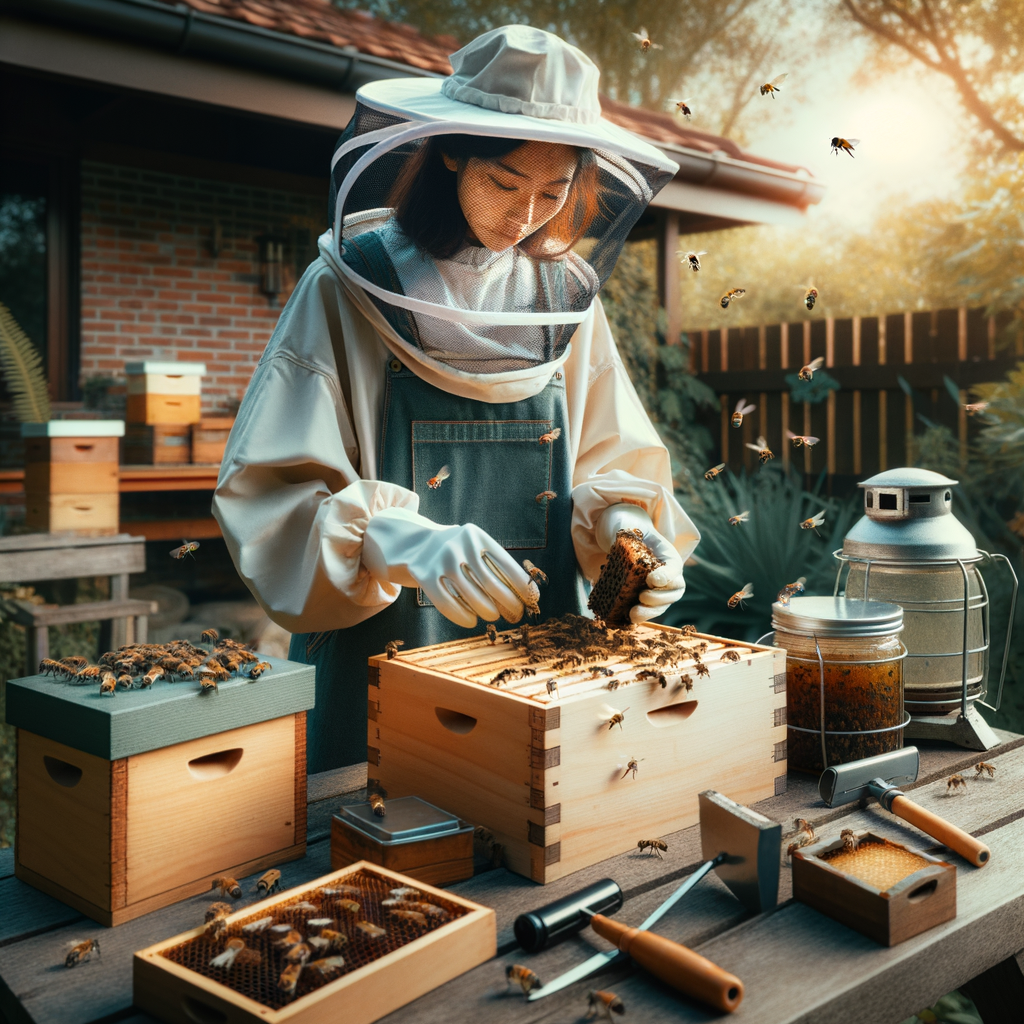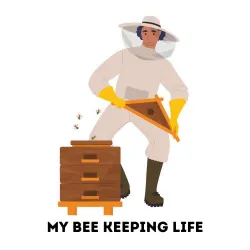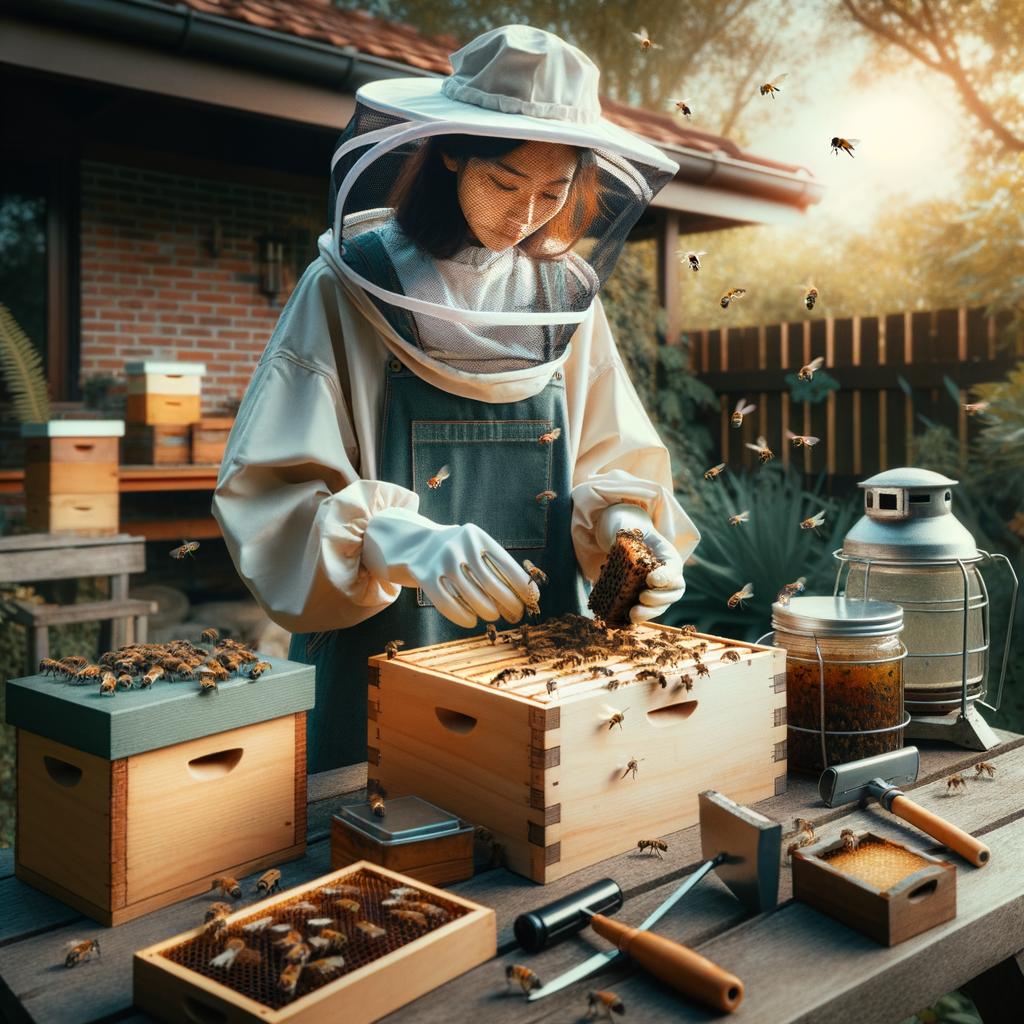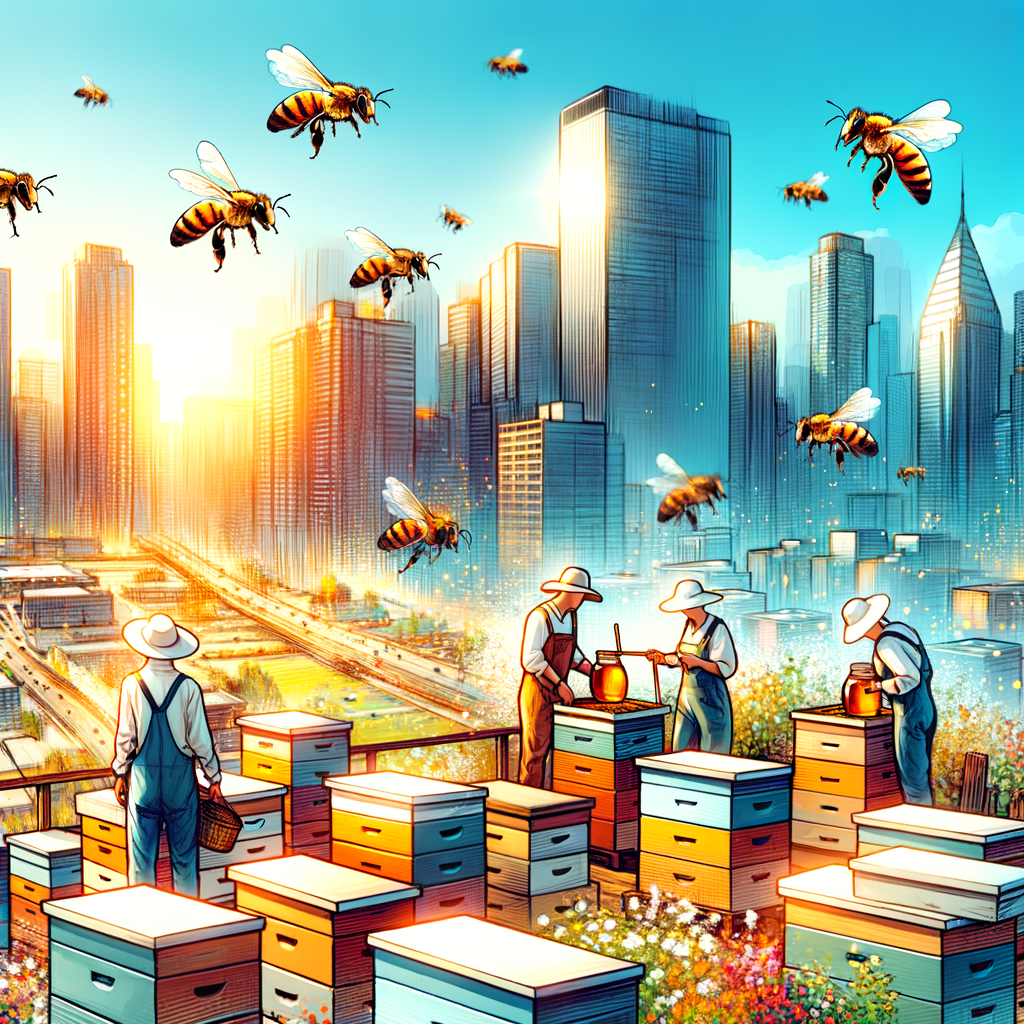
Introduction to Beekeeping as a Leisure Activity
Beekeeping, also known as apiculture, is a fascinating hobby that many people around the world enjoy. It’s not just about producing honey; it’s about fostering a deeper understanding of nature and our role in it. In this section, we’ll explore the basics of beekeeping and why it’s considered a rewarding hobby.
-
- Understanding the basics of beekeeping
Beekeeping is the maintenance of bee colonies, usually in hives, by humans. A beekeeper keeps bees in order to collect honey and other products that the hive produces, to pollinate crops, or to produce bees for sale to other beekeepers. The location where bees are kept is called an apiary or “bee yard”.
Bees are not pets; they are wild creatures that we can provide a home for. As a beekeeper, your role is to create a safe and healthy environment for the bees to thrive. This includes providing them with a hive, ensuring they have access to food and water, and protecting them from predators and disease.
-
- Why beekeeping is considered a rewarding hobby
Beekeeping is a hobby that offers a myriad of rewards. For one, it allows you to contribute to the environment. Bees play a crucial role in pollination, which is vital for the growth of plants and the production of fruits and vegetables. By keeping bees, you’re helping to maintain and boost local plant biodiversity.
Additionally, beekeeping can be a source of relaxation and stress relief. Spending time in nature, observing the bees, and engaging in the physical activity of maintaining the hives can help to reduce stress and improve mental well-being. Plus, there’s the sweet reward of harvesting your own honey!
In the following sections, we’ll delve deeper into the importance of beekeeping, the advantages it offers, and how to get started if you’re a beginner. We’ll also discuss the equipment you’ll need and how to practice sustainable beekeeping. So, let’s embark on this exciting journey into the world of bees!
The Importance of Beekeeping
While beekeeping might seem like a simple hobby, it plays a significant role in our ecosystem and contributes to sustainability. Let’s delve into these aspects to understand the importance of beekeeping better.
-
- Role of Bees in the Ecosystem
Bees are often referred to as the guardians of the ecosystem. They play a crucial role in pollination, which is the process of transferring pollen from the male parts of a flower to the female parts. This results in the production of fruits, vegetables, and nuts that we consume daily. In fact, it’s estimated that one-third of the food we eat relies on pollination, primarily by bees.
Without bees, our food system would drastically change, affecting not only human beings but also wildlife that relies on the same plants for food and habitat. Therefore, bees are essential for maintaining biodiversity in our ecosystem.
-
- How Beekeeping Contributes to Sustainability
Beekeeping is a sustainable practice that contributes to our environment in several ways. First, it helps increase the population of bees, which are declining due to various factors like habitat loss, pesticides, and climate change. By providing bees with a safe and nurturing environment, beekeepers help in conserving these vital pollinators.
Second, beekeeping promotes local food production. Honey and other bee products like beeswax and propolis can be harvested and used or sold locally, reducing the need for transportation and associated carbon emissions. This contributes to a more sustainable and resilient local food system.
Lastly, beekeeping encourages the planting of diverse plants, including those that are native and beneficial to bees. This not only provides food for bees but also enhances local biodiversity, creating healthier and more resilient ecosystems.
Beekeeping is more than just a hobby. It’s a practice that supports the health of our ecosystem and contributes to sustainability. By becoming a beekeeper, you’re not only engaging in a rewarding activity but also playing a part in preserving our planet.
Advantages of Beekeeping
As a hobby, beekeeping offers a multitude of benefits that go beyond the obvious production of honey. Let’s delve into some of the significant advantages of this fascinating pastime.
Beekeeping Hobby Benefits
There are several key benefits to beekeeping as a hobby. Here are the top three:
-
- Health benefits of honey and other bee products
Honey, a natural sweetener produced by bees, is packed with antioxidants and can help improve cholesterol levels. Additionally, other bee products like propolis and royal jelly have been known to have antibacterial, anti-inflammatory, and healing properties. Beekeeping allows you to have direct access to these healthful products right in your backyard.
-
- Contribution to local biodiversity
Bees play a crucial role in pollinating plants, which is essential for the survival of our ecosystems. By keeping bees, you are contributing to the local biodiversity and helping to maintain a healthy environment. In fact, bees are responsible for pollinating about one-sixth of the flowering plant species worldwide.
-
- Stress relief and therapeutic effects
Beekeeping can also serve as a form of therapy. The process of tending to a hive requires patience and focus, which can help reduce stress levels. Moreover, the rhythmic and repetitive nature of beekeeping tasks can have a calming effect, similar to meditation.
In conclusion, beekeeping is a hobby that offers numerous benefits. It’s not just about the honey; it’s about contributing to the environment, reaping health benefits, and finding a unique way to relax and unwind.
Benefits of Backyard Beekeeping
Backyard beekeeping is a hobby that offers numerous benefits. Not only does it contribute to the environment, but it also provides personal advantages. Let’s explore two significant benefits of backyard beekeeping:
-
- Convenience and Accessibility
One of the main benefits of backyard beekeeping is the convenience and accessibility it offers. You don’t need a large farm or a vast field to start your beekeeping journey. A small backyard can serve as a perfect place for your bee hives. This makes beekeeping a hobby that is accessible to many people, regardless of where they live. Plus, having your bee hives in your backyard means you can easily check on your bees, maintain the hives, and harvest the honey whenever you want. It’s as simple as stepping outside your door!
-
- Possibility of a Secondary Income Source
Did you know that your beekeeping hobby could also become a source of secondary income? Yes, it’s true! The honey produced by your bees can be sold for profit. Honey is a natural sweetener that is in high demand due to its health benefits. Besides honey, bees also produce beeswax, which can be used to make candles, lip balms, and other products. Selling these bee products can provide a nice supplemental income. However, it’s important to remember that the amount of income you can generate depends on the number of hives you have and the health of your bees.
It’s convenient, accessible, and can even provide a secondary income. So why not give it a try?
Beekeeping for Beginners
Embarking on the journey of beekeeping can be both exciting and rewarding. As a beginner, there are a few key areas you should focus on to ensure a successful start to your new hobby.
Hobby Beekeeping Tips
Here are some essential tips to help you get started:
-
- Choosing the right equipment: The first step in your beekeeping journey is to select the right equipment. This includes a bee suit for protection, a smoker to calm the bees, a hive tool for inspecting the hive, and of course, the beehive itself. It’s crucial to choose high-quality equipment to ensure the safety and health of your bees.
-
- Understanding bee behavior: Bees are fascinating creatures with complex behaviors. Understanding these behaviors is key to successful beekeeping. For instance, bees communicate through dances, and the queen bee has a unique scent. By observing your bees, you can learn to understand their needs and behaviors, which will help you manage your hive effectively.
- Joining local beekeeping associations: Joining a local beekeeping association can provide invaluable support and resources. Experienced beekeepers can offer advice and guidance, and you can learn from their experiences. Additionally, these associations often offer workshops and training sessions for beginners.
Remember, beekeeping is a journey that requires patience and dedication. But with the right approach, it can be a rewarding and enjoyable hobby. Happy beekeeping!
Beekeeping Hobby Guide
Embarking on the journey of beekeeping can be both exciting and rewarding. Here, we will guide you through the fundamental steps of setting up a beehive, caring for your bees, and harvesting honey.
-
- Step-by-step process of setting up a beehive
Setting up a beehive requires careful planning and execution. Here are the steps to follow:
-
-
- Choose a suitable location for your beehive. It should be a sunny spot, away from high traffic areas.
- Purchase a pre-assembled beehive or assemble one yourself. It should include a bottom board, brood chamber, honey supers, and a hive cover.
- Install the bees into the hive. This is usually done by shaking the bees from a package into the hive.
- Monitor the hive regularly to ensure the bees are adjusting well to their new home.
- How to care for your bees
-
Proper care is essential for the health and productivity of your bees. Here’s how to care for them:
-
-
- Regularly check the hive for signs of disease or pests.
- Provide a nearby water source for the bees, especially during hot weather.
- Ensure the hive has enough food. In the absence of flowers, feed the bees with sugar syrup.
- Replace the queen bee every two years to maintain a strong and productive colony.
- Harvesting honey: best practices
-
Harvesting honey is the most rewarding part of beekeeping. Here are some best practices:
-
- Wait until the majority of the honeycombs in the hive are capped.
- Use a bee brush or a bee blower to gently remove the bees from the honeycombs.
- Extract the honey using a honey extractor or by crushing and straining the combs.
- Store the honey in clean, dry jars and keep them in a cool, dark place.
Remember, beekeeping is a learning process. Don’t be discouraged if you encounter challenges along the way. With patience and persistence, you’ll soon be reaping the sweet rewards of your hard work.
Beekeeping Hobby Equipment
When it comes to beekeeping as a hobby, having the right equipment is crucial. Not only does it ensure the safety and well-being of the bees, but it also makes the process more enjoyable and efficient for the beekeeper. In this section, we will discuss the essential tools every beekeeper needs, how to choose quality equipment, and tips for maintaining and storing your beekeeping gear.
-
Essential Tools for Every Beekeeper
Whether you’re a beginner or an experienced beekeeper, there are certain tools that are essential to your beekeeping practice. These include a bee suit for protection, a smoker to calm the bees, a hive tool for opening the hive and removing frames, and a bee brush for gently moving bees. Additionally, you’ll need at least one beehive, which includes the hive body, frames, and a hive stand.
-
Choosing Quality Equipment
When it comes to beekeeping, quality equipment is a worthwhile investment. High-quality tools will not only last longer, but they can also make your beekeeping tasks easier and more efficient. When choosing equipment, look for durable materials and sturdy construction. For example, a stainless steel hive tool will be more durable than one made of plastic. Similarly, a bee suit made of thick, breathable fabric will offer better protection than a thin, cheaply made one.
-
Maintaining and Storing Your Equipment
Maintaining and storing your beekeeping equipment properly can extend its lifespan and ensure it’s ready to use when you need it. After each use, clean your tools to remove any propolis or wax. Store your equipment in a dry, cool place to prevent rust and damage. Your bee suit should be washed regularly and stored away from direct sunlight to prevent fading and deterioration. As for your beehives, regular inspections and cleaning can help prevent disease and pest infestations.
Remember, beekeeping is not just about the honey; it’s also about the journey and the joy of working with these amazing creatures.
Sustainable Hobby Beekeeping
As we delve deeper into the world of beekeeping, it is essential to discuss a significant aspect: sustainable hobby beekeeping. This practice not only benefits the beekeepers but also contributes positively to the environment. Let’s explore the practices involved and the impact it has on our surroundings.
- Practices for Sustainable Beekeeping
Practices for sustainable beekeeping are designed to ensure the long-term survival and health of bee colonies. These practices are simple and can be easily incorporated into your beekeeping hobby.
Firstly, avoid the use of chemicals. Chemicals can harm the bees and contaminate the honey. Instead, opt for natural methods to manage pests and diseases. Secondly, provide a diverse and continuous food source for your bees. Planting a variety of flowers that bloom at different times of the year will ensure that your bees have a constant source of nectar.
Lastly, practice responsible honey harvesting. Over-harvesting can leave the bees without enough food for the winter, leading to the death of the colony. Always leave enough honey for the bees to survive.
- Impact of Sustainable Beekeeping on the Environment
Sustainable beekeeping has a significant positive impact on the environment. Bees play a crucial role in pollination, which is vital for the growth of plants and crops. By maintaining healthy bee colonies, we help to sustain our ecosystem.
Moreover, sustainable beekeeping promotes biodiversity. By planting a variety of flowers for the bees, we are also providing habitats for other insects and birds. This contributes to a more diverse and balanced ecosystem.
By adopting sustainable practices, we can ensure the survival of our bees and the health of our ecosystem.
Conclusion: Why Beekeeping is the Perfect Hobby
Beekeeping is more than just a hobby; it’s a lifestyle that brings numerous benefits to our environment, our health, and our communities. Let’s recap why this is the perfect hobby for you.
-
- Recap of the benefits and importance of beekeeping
Beekeeping is a rewarding hobby that offers many benefits. It promotes biodiversity, helps in pollination, and contributes to the preservation of our ecosystem. Not only does it provide a source of honey and beeswax, but it also offers therapeutic benefits. The act of beekeeping can be calming and meditative, helping to reduce stress and promote mental well-being.
-
- Encouragement for readers to start their beekeeping journey
Starting your beekeeping journey may seem daunting at first, but remember, every expert was once a beginner. With the right equipment, knowledge, and a bit of patience, you too can become a successful beekeeper. So, why wait? Start your beekeeping journey today and contribute to a healthier and more sustainable world.
Remember, beekeeping is a hobby that not only enriches your life but also makes a significant contribution to our environment. It’s a hobby that truly makes a difference. So, are you ready to embark on your beekeeping journey?








